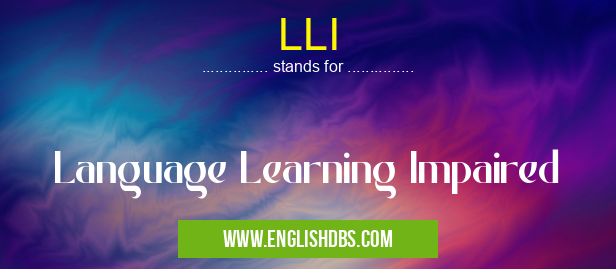What does LLI mean in EDUCATIONAL
Learning Disabilities are very common among school going children, adolescents and adults. Language Learning Impairment (LLI) is one such learning disability that affects the ability to communicate orally, comprehend written language or both. It can cause difficulty in understanding, speaking, reading and writing different languages. For people with LLI, there may be a delay in typical language milestones like identifying names of objects or early conversation.

LLI meaning in Educational in Community
LLI mostly used in an acronym Educational in Category Community that means Language Learning Impaired
Shorthand: LLI,
Full Form: Language Learning Impaired
For more information of "Language Learning Impaired", see the section below.
» Community » Educational
What is LLI?
LLI stands for Language Learning Impairment. It is an umbrella term used to describe difficulties related to the development of speech and language skills such as understanding spoken or written words, expressing oneself clearly and correctly, remembering words or sounds etc. It affects children’s learning ability in a classroom setting. LLI can cause delays in a child’s ability to acquire basic language skills like grammar and pronunciation. Furthermore, it can also cause difficulty with reading comprehension due to difficulty with decoding unfamiliar words or understanding what was read. There are various levels of severity associated with LLI ranging from mild to severe depending on how much it impacts a person's ability to communicate effectively in school, work or other activities.
Diagnosis of LLI
The diagnosis of LLI requires an assessment from a medical professional like a speech-language pathologist or developmental pediatrician who has experience dealing with learning disabilities. The severity can vary widely between individuals which means different types of treatment approaches may need to be employed depending on the individual’s needs. Several factors such as age (children may not show symptoms until they enter formal schooling), intelligence level (IQ) and familial history all help determine the best course of treatment for each individual case.
Treatment
Treatment for Language Learning Impairment depends on its severity as well as other complicating factors related to the individual case such as IQ level, communication style preferences and home environment factors that could contribute to its development or maintenance over time. Generally speaking speech-language therapy is often recommended when diagnosed with LLI; however therapy should also include family training which incorporates strategies for communicating at home so that everyone can benefit from improvements made during intervention sessions.
Essential Questions and Answers on Language Learning Impaired in "COMMUNITY»EDUCATIONAL"
What is Language Learning Impaired (LLI)?
Language Learning Impaired (LLI) is a condition in which individuals have difficulty obtaining, processing or retaining verbal information, including language and speech. It can manifest through various signs and symptoms such as difficulty understanding what has been said and difficulty expressing oneself verbally.
Who is Affected by LLI?
LLI affects boys more than girls, and there are varying levels of severity. Furthermore, LLI can vary across different age groups – typically being more severe in young children who may not be receiving the necessary help to overcome their challenges.
What are the Causes of LLI?
The cause of LLI can be varied, ranging from having an auditory processing disorder to dyslexia or even autism spectrum disorder (ASD). There also might be underlying physical causes such as a hearing impairment, cerebral palsy, tourette syndrome, complicating syndromes such as down syndrome or any other neurological impairment that could affect language development.
What are the Symptoms of LLI?
Generally speaking, people with LLI will have difficulty with critical aspects of communication including comprehension skills, articulation and fluency. They may also show difficulty in completing certain tasks that require verbal instructions; usually due to their poor ability to understand spoken words accurately. Additionally, they may demonstrate slow reading speeds; lack of interest in socializing; poor academic performance; confusion between related words; anxiety related to communication; and general frustration when interacting with others.
How is LLI Diagnosed?
To diagnose a person with LLI, it is important for healthcare professionals to assess the individual’s development history along with their current functioning level. Speech-language pathologists perform several assessments including evaluating fluency in conversation and spoken language tests such as expressive vocabularies tests; receptive language tests such as sentence completion tasks; phonological process assessments; articulation evaluations; and non-verbal cognitive assessments.
Is there Treatment for People with LLI?
Yes! Depending on the cause of their condition, different forms of treatment may be recommended by healthcare professionals. Speech therapy sessions are often used to offer support with functional communication skills such as pronunciation accuracy and speech intelligibility while educational therapists teach strategies that focus on reading comprehension. Other forms of treatment include support from audiologists or occupational therapists if needed.
Are There Any Strategies That Could Help Overcome Challenges Associated With LLI?
Yes! Different interventions can help reduce challenges associated with language learning impairments – this includes providing specialized instruction tailored around an individual’s needs while ensuring they receive daily practice opportunities for these skills via exercises presented within multiple modalities (i.e., visually through pictures/objects/signing or orally using verbal cueing).
Is it Necessary To Seek Professional Help When Dealing With Language Learning Impairment?
If you suspect someone you know may be suffering from a language learning impairment then it is important to consult a specialist in order to receive an accurate diagnosis followed by appropriate treatment recommendations tailored around their individual needs. Doing so ensures they gain access to proper care essential for managing their condition effectively.
Final Words:
Language Learning Impairment is a learning disability affecting people’s ability to communicate orally, comprehend written language or both. People who have been diagnosed with this disorder may struggle with academic tasks due to their inability to process spoken or written information accurately but they can find success through appropriate treatments that may include Speech-Language Therapy as well as family training focused on improving communication techniques at home.
